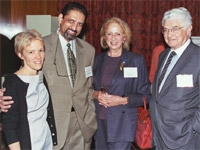
From left: Dr. Nancy Nealon, Dr. Sudhir Diwan, Daisy Soros, and her husband, Paul Soros.
On March 3, Daisy Soros, Weill Cornell Campaign vice chair and overseer, hosted an "Information Please" breakfast event entitled "Managing Your Pain: New Approaches," addressing issues related to the causes of chronic pain and the standards used in evaluating and treating it. Founded by Ms. Soros, "Information Please" highlights new research and other topics of importance to the Medical College's mission.
The meeting featured presentations by Dr. Nancy Nealon, assistant professor of clinical medicine and clinical neurology, and Dr. Sudhir Diwan, director of Pain Management Services and Division of Pain Medicine and assistant professor of clinical medicine.
In her opening remarks, Ms. Soros commented on the timeliness of the presentation, as chronic pain becomes an even more important facet of health care as baby boomers age. In addition, she noted that since persistent pain also affects many people, its social and psychological toll needed to be addressed.
Dr. Nealon used migraines as an example to illustrate the biological processes of pain as it is experienced in the body, showing diagrams of what happens in the brain as it senses pain. Migraines occur with acute episodes that can be triggered by factors in the environment or inside the body. It affects 28 million adults—21 million of them women. Its prevalence peaks in the 25 to 55 age range. Dr. Nealon emphasized the importance of treating pain because, as in the case of migraines, if left untreated it may reach a point at which even medications may not be effective.
Dr. Diwan introduced the various options for pain management, including physical therapy, alternative therapy, invasive pain therapy and advanced pain therapies. Careful to point out that pain management is "the balance between the side effects of medication and controlling the pain," Dr. Diwan elaborated on the physiological and psychological effects on sufferers. After describing the different types of pain, he focused on the causes of pain associated with osteoarthritis, cancer and cancer treatment. He also described leading-edge therapies like the intrathecal pump and catheter, for which the Pain Management Center at Weill Cornell is renowned. Through such advanced pain therapies, chronic sufferers are able to live a normal life free of pain, without the debilitating effects of medication.
For more information on the Division of Pain Management, please contact Leah Bentley at (212) 821-0530 or leb2006@med.cornell.edu.
Photo by Marie Wallace.

